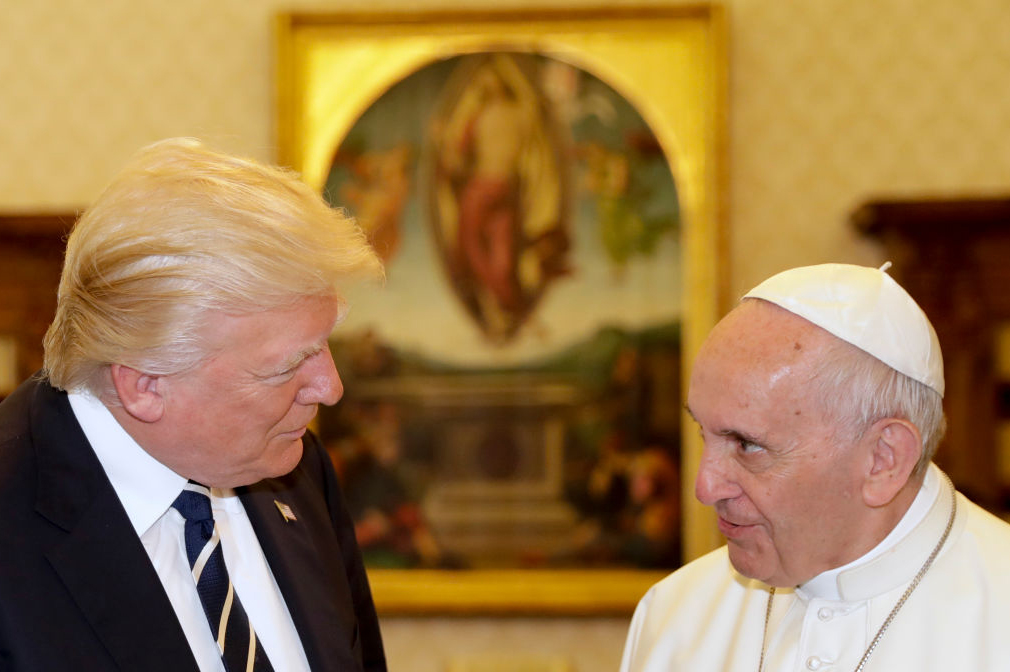On Twitter yesterday, Donald Trump sent out the political equivalent of a Hail Mary pass. ‘Today we commemorate the 100th Anniversary of the birth of Saint John Paul II,’ tweeted the President. ‘HAPPY BIRTHDAY!’
This was not just Trump being thoughtful about a great spiritual leader. It was an electoral appeal to Catholics on social media and a move that suggests Trump is worried about the Catholic vote. He’s right to be.
There are endless debates about the extent to which America’s Catholics decide elections — or, indeed, whether the Catholic vote exists at all, given the diversity of the nation’s sprawling Catholic population. But that diversity is the very reason why the Catholic vote is a useful barometer of the nation’s political climate. Catholics represent about a quarter of the electorate — and, as Matt Schlapp, the co-chair of the newly formed Catholics for Trump coalition says, ‘You could view it as the ultimate swing constituency in the country.’
Trump won the Catholic vote 52 percent to 48 in 2016, according to most sources — though some research suggests it was a more even split. Mitt Romney, by contrast, lost it to Obama 50 to 48. In these small margins lie the key to the Electoral College.
The Catholic vote is nothing if not elusive. Hillary Clinton appointed Tim Kaine, a Scots-Irish Catholic, in an attempt to shore up her support. That failed. She lost a significant share of the Democratic Hispanic Catholic vote, as it fell from 75 percent for Obama to 67 percent for her. Furthermore, Clinton lost three percentage points of the white Catholic vote, and we know that lower-class white Catholics in swing states such as Wisconsin, Pennsylvania and Michigan helped decide the 2016 result.
Joe Biden, a practicing Catholic, is a very different proposition to Clinton. Republicans can and will denounce him for supporting supporting abortion and the full LGBTQ agenda. They will point out that he and President Obama forced the Little Sisters of the Poor, an order of celibate nuns, to provide health insurance that covers contraception. No doubt that will put off believers, but devout Catholics who follow politics closely and take the Church’s pro-life position seriously are likely to have already made up their minds against the militantly pro-abortion Democrats.
The trouble for the Trump campaign is all those self-identified Catholics who may or may not go to Church, but who feel instinctively that Biden is one of them. He wears a rosary on his wrist, goes on television on Ash Wednesday with a black cross still smudged on his forehead, and litters his speech with folksy Irishisms. He appeals, then, to many of those working-class white Catholics in the rust belt and mid-west who will decide the election. Biden talks a lot about all the pain and loss he has had to endure in his life. Many Catholics, who find comfort in suffering, are drawn to that.
Team Trump is well aware of the Catholic problem that Biden poses. The evangelical vote remains rock solidly in the Grand Old Party’s favor, but it seems Catholics are more likely to put off by the President’s past iniquity, the coarseness of his tweeting, and the fact he is a Presbyterian. That’s why the Catholics For Trump coalition was launched in March, though that campaign has, like everything else, been hampered by the health crisis.
Trump can point to all his judicial appointments, which have raised the possibility of Roe v. Wade being overturned at some point in the future, and the pro-life tenor of his administration. Vice President Mike Pence is, clearly, a very serious Christian and pro-lifer. But Pence is a Catholic who became an evangelical, and that might explain why many Catholics don’t relate to him. In fact, looking at Trump’s cabinet, Catholics don’t seem especially well represented. A sort of hybrid-faithfulness dominates: Secretary of State Mike Pompeo is an evangelical, Secretary of Housing and Urban Development Ben Carson a Seventh Day Adventist, and Betsy DeVos an ‘elder’ at the non-denominational Mars Hill Bible Church.
***
Get three months of The Spectator for just $9.99 — plus a Spectator Parker pen
***
Such a cross-section reflects America’s ultra-modern Christianity. For regular Catholics, however, it makes Biden’s more good ol’ fashioned Catholic hypocrisy seem less wacky and therefore quite attractive.
Trump also has a Pope Francis problem: he has crossed swords with the current pontiff over immigration, which may be why he chose to celebrate the deceased and more conservative John Paul II yesterday.
Where Biden seems to be struggling, however, is with Hispanic Catholics, traditionally a reliable source of Democratic support. Biden has already lost the Hispanic vote to Bernie Sanders in many states. His campaign has struggled with Latino outreach amid the pandemic. Surveys suggest that Hispanic turnout could be low this year, which could be crucial to deciding how a state like Florida will swing. As Hillary Clinton knows, the Catholic vote is as vital as it is elusive.


















